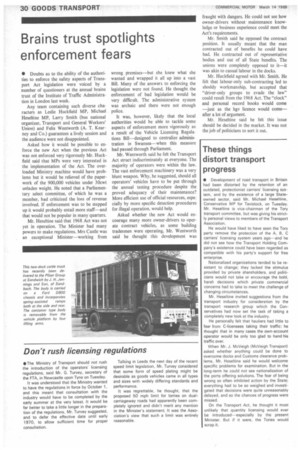Brains trust spotlights enforcement fears
Page 32

If you've noticed an error in this article please click here to report it so we can fix it.
• Doubts as to the ability of the authorities to enforce the safety aspects of Transport Act legislation were voiced by a number of questioners at the annual brains trust of the Institute of Traffic Administration in London last week.
Any team containing such diverse characters as Leslie Huckfield MP, Michael Heseltine MP, Larry Smith (bus national organizer, Transport and General Workers' Union) and Felix Wentworth (A. T. Kearney and Co.) guarantees a lively session and the audience were not disappointed.
Asked how it would be possible to enforce the new Act when the previous Act was not enforced very rigorously Mr. Huckfield said that MPs were very interested in the implementation of the Act. The overloaded Ministry machine would have problems but it would be relieved of the paperwork of the 900,000 vehicles under 30cwt unladen weight. He noted that a Parliamentary select committee, of which he was a member, had criticized the loss of revenue involved. If enforcement was to be stepped up it would probably entail more staff—and that would not be popular in many quarters.
Mr. Heseltine said that 1968 Act was not yet in operation. The Minister had many powers to make regulations. Mrs Castle was an exceptional Minister—working from wrong premises—but she knew what she wanted and wrapped it all up into a vast Bill. Many of the answers to enforcing the legislation were not found. He thought the enforcement of bad legislation would be very difficult. The administrative system was archaic and there were not enough police.
It was, however, likely that the local authorities would be able to tackle some aspects of enforcement more vigorously as a result of the Vehicle Licensing Regulations Bill—designed to centralize administration in Swansea—when this measure had passed through Parliament.
Mr. Wentworth said he felt the Transport Act struct indiscriminately at everyone. The majority of operators were within the law. The vast enforcement machinery was a very blunt weapon. Why, he suggested, should all operators' vehicles have to be put through the annual testing procedure despite the proved adequacy of their maintenance? More efficient use of official resources, especially by more specific detection procedures for illegal operation, would help.
Asked whether the new Act would encourage many more owner-drivers to operate contract vehicles, as some building tradesmen were operating, Mr. Wentworth said he thought this development was fraught with dangers. He could not see how owner-drivers without maintenance knowledge or business experience could meet the Act's requirements.
Mr. Smith said he opposed the contract position. It usually meant that the man contracted out of benefits he could have had. He contracted out of representative bodies and out of all State benefits. The unions were completely opposed to it—it was akin to casual labour in the docks.
Mr. Huckfield agreed with Mr. Smith. He felt that labour-only sub-contracting led to shoddy workmanship, but accepted that "driver-only groups to evade the law" could result from the 1968 Act. The "clock" and personal record books would come —just as the hgv licence would come— after a lot of argument.
Mr. Heseltine said he felt this issue should be decided in the market. It was not the job of politicians to sort it out.




















































































































